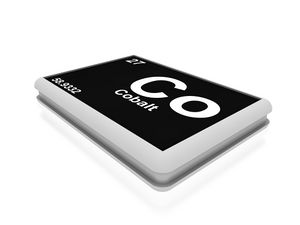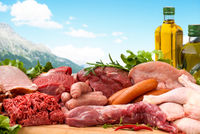Cobalt
| See Also | Minerals |
|---|
Cobalt is a trace mineral stored in the liver that is a component of vitamin B12. It is important in the normal development of red-blood cells. It's also involved in various enzyme reactions and aids in the formation of myelin nerve coverings[1].
Contents
Food Sources
The following foods are natural sources of cobalt. For a more expansive list on food sources of specific nutrients visit Health Canada's Dietary Reference Intakes for Elements or USDA's National Nutrient Database
Small amounts can also be found in plant sources, and are best utilized as part of vitamin B12-rich foods.
Uses
The following are the primary uses for cobalt: [1]
- Anemia: Cobalt supplementation may play a role in treating anemia when other treatments don't work.
- Cancer: Cobalt in the form of radioactive cobalt-60 may treat certain kinds of cancer.
- Fatigue, digestive disorders, neuromuscular problems: Cobalt may treat these conditions.
- Recent and severe burns and injuries: Individuals with recent and severe burns and injuries may need additional amounts.
- Anorexia Nervosa and Bulimia: Individuals with anorexia nervosa and bulimia may need additional amounts.
- Vegan and Vegetarians: Many vegans and vegetarians have inadequate B12 intake and may require additional amounts of cobalt.
Deficiency Symptoms
Deficiency in cobalt may lead to pernicious anemia due to the fact that it is an essential component of vitamin B12. Signs and symptoms may include:
- weakness, especially in the arms and legs
- sore tongue
- nausea, appetite loss, weight loss
- bleeding gums
- numbness and tingling in hands and feet
- difficulty maintaining balance
- pale lips, tongue, gums
- confusion and dementia
- headache
- poor memory
Excess Symptoms
In doses of 20-30mg/day, cobalt can lead to:
- polycythemia
- enlargement of the thyroid gland (also can lead to thyroid growth in infants)
- enlargement of the heart leading to congestive heart failure
Assessment Procedure
Lab tests to detect deficiency: [1]
- Concentrations in human plasma
- Measured in bioassay as part of vitamin B12
Prescribing Considerations
- The recommended dosages varies based on age and health status. To determine what your specific requirements are talk to your naturopathic doctor or other trained medical professional.
Safety
- Generally: Eat a balanced diet to prevent deficiency
- Pregnancy: Take as B12 if doctor advises.
- Breastfeeding: Take as B12 if doctor advises.
Drug Interactions
- Drug Interactions include:[1]
- Colchicine - Drug may cause inaccurate lab studies of cobalt or vitamin B12.
- Neomycin - Drug may cause inaccurate lab studies of cobalt or vitamin B12.
- Para-aminosalicylic Acid - Drug may cause inaccurate lab studies of cobalt or vitamin B12.
- Phenytoin - Drug may cause inaccurate lab studies of cobalt or vitamin B12.
Other Interactions
- Other Interactions include [1]
- Alcohol - Some beer contains cobalt as a stabilizer. Individuals who consume high volumes of beer containing cobalt have an increased risk of developing cobalt toxicity which can lead to cardiomyopathy and congestive heart failure.

